
Sustainability at Extra Ed
Extra Ed operates on the understanding that the world is facing an existential crisis with respect to the environment. We cannot ignore this - especially because we work with children and play a part in preparing them for a future that should be as bright as possible.
Even during our earliest start-up days, we have integrated actively making a difference in the preservation and restoration of our environment into the most basic ways in which we do business. And, we have made sure that it has remained in lockstep with all growth that has come.
Several years on, we are proud of our accomplishments. Our tree-planting initiative has certainly been the highlight, but we have done much more - and as we continue to grow, so too will all of our efforts to preserve and restore our environment.
Please take a look at what we have done, and where we are going with all of this. There has been a long learning curve, some hits and misses, but we are still fighting the good fight for ourselves, and most importantly, for the kids!
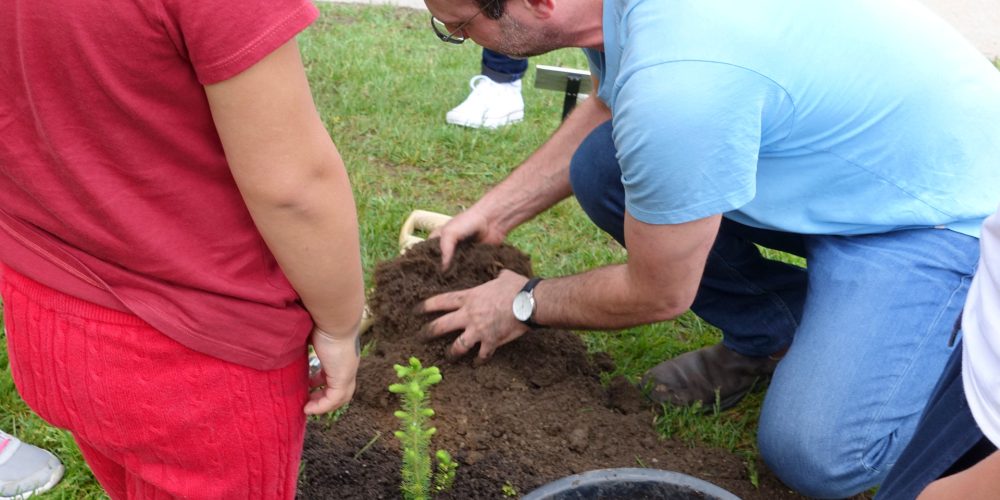
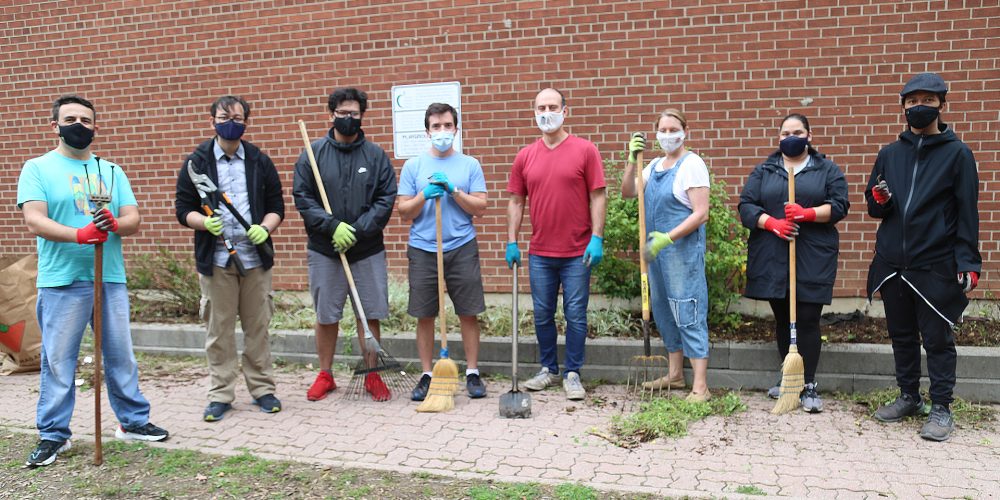
Letter from our founder
It is my firm belief that every single one of us, each and every day, has a moral responsibility to be actively trying to help prevent the current environmental crisis from getting worse. By extension, I also believe it is incumbent on every single business or organization to do the same, or at the very least, to account for what they are (or are not) doing in the face of the existential threat we all know is happening. I understand that not everyone may share these views - but I stand firm here. And as long as I am running Extra Ed, these beliefs will remain front and center in how I direct this business.
I founded Extra Ed in 2015, just after my first child was born. It was a time of great ideals for me - not just about being a father, but also about making a positive impact in the world that my wife had brought our child into.
But it wasn’t always like that. For many years before my child was born, I found myself struggling to digest all the sad news about the state of the world’s environment. Yes, climate change was grabbing all of the major headlines, for good reason. But I knew it didn’t stop there: from species extinction to pollution in rivers and lakes and oceans, to overconsumption, to runaway waste, to unsustainable deforestation and habitat destruction, and to needless wars that themselves polluted and destroyed our world - it all seemed endless. And hopeless.
The worst part was that I felt powerless to do anything about it. It all seemed so much bigger than me - so what was the point? But when my child was born, my thinking around all of this changed dramatically. I decided that if I wasn’t going to at least try to do something, then all I would be teaching my children to do was give up. I would be giving up on them, and their future. So I founded Extra Ed – a business that would integrate environmental action into its day-to-day operations right from the beginning.
To be clear, Extra Ed is first and foremost an organization that delivers quality educational programs and that aims to be the best at what it does. But the focus on this “Sustainability” page is on what we are doing besides just running a business - and more specifically, what we are doing in the face of a global environmental crisis. The reason I mention being good at what we do, however, is that it is a core part of our efforts to protect and restore our environment; because in the end, all the ideals in the world about making a difference environmentally through this business would mean nothing if the business itself wasn’t sustainable. And that is why we have aptly named this page “Sustainability.” Because our efforts with the environment hinge on us being great at what we do, so that we can keep this effort moving.
Several years on, I am immensely proud to say that the ideals I started this business out with are well-intact. We have created and delivered a wide range of educational programs that are a great combination of fun, challenging, and interesting. We have become Educational Partners with the TDSB and approved vendors in multiple school boards across southern Ontario. Our programs are popular with children, but have also earned the respect of parents, parent councils, and school administrations.
On the environmental front, Extra Ed parents, students, and employees – partnering with wonderful environmental organizations - have volunteered to plant over twenty thousand trees and have cleaned up local parks and school playgrounds. We have diverted tens of thousands of sheets of paper from school waste bins and turned them into our office paper and notepads, school worksheets, and flyers. And as we have grown, we have also tried to stay nimble, by striving to schedule instructors who live close to their respective programs to limit their transportation footprints.
We are not perfect. Nobody is. But I am convinced that if every single business out there took action on the environment in proportion to what we have done at Extra Ed, that we would all be better off. I invite you to take a look on this page to see what we have done, what we are doing, and where we are going.
Yakos Spiliotopolous
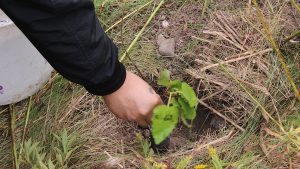
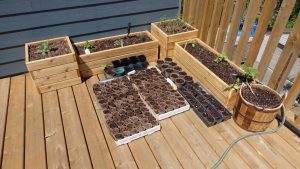
Tree planting
Our tree planting program has easily been our greatest success as far as environmental initiatives go. But it has been a long road to get here, with a steep learning curve, lots of dead trees – but, many thousands more that have survived.
The Quick History – the hits, and the misses, but a good finish!
When Extra Ed was founded, we decided that for every registration we received, we would give a baby tree to that child and family. In earnest, we started our tree planting program with seeds and pots, in our kitchens and on our balconies. We stratified the seeds, we planted them, and then took the sprouts to the schools to give to the students who asked for them. As for the extra tree sprouts (the ones that parents had asked that we plant ourselves), we took them to school fairs and gave them away.
The very naïve idea in those early days was that children and parents would take these fragile little baby trees, symbols of a bright and promising future, plant them, water them, and nurture them to grow into a beautiful canopy that would reign over our city for hundreds of years to come. What could go wrong…right?
Unfortunately, a lot can go wrong.
The first and most important thing that went wrong was the fact that probably none of these early trees survived, or even had much of a chance of survival. If it wasn’t local wildlife, like humans and dogs, killing or damaging them beyond recognition, it was poor soil, pollution, or just a lack of regular water and nutrients to help them grow.
Sure, it looked good when we handed a tiny little sprout to the kids and parents, but our goal was actual impact, and we soon realized, this was not working.
But even if it was working, as we grew as an organization, it became clear that this approach still needed to change. First off, although the idea of growing trees from seeds was noble, it was also short-sighted. Far too much work, and space, was required, and we didn’t have it. Second, even if we did stick with the approach of growing trees from seeds, giving them to students and families wasn’t going to help them survive. What we needed was a place to plant them ourselves, but we quickly learned that it is extremely hard to find land - especially in a city - to plant a bunch of home-grown trees, even if they are native species.
During the pandemic, we turned to local organizations for help, and that was when things really turned around. We forged relationships with tree nurseries that grew the trees, and with organizations that both planted them for us, and even allowed us to join them in getting them into the ground. Over the years, Extra Ed staff, along with parents and students from our programs, have planted thousands of trees. And the best part was that once they were planted, these same organizations took care of them and gave them a great shot at survival. One of the not-so-fun facts about planting trees that we have learned is that the vast majority of them will likely not survive without care after planting. Today, Extra Ed’s trees have an approximately 80% survival rate, which is very high - and all thanks to the wonderful organizations we have partnered with.
As of September, 2023, big changes have come to our tree planting program. We are no longer giving baby trees to families and students. The simple reason is that those trees have a much better chance of survival if they are planted and maintained by organizations that do this every single day.
We are working exclusively with organizations that will not only plant trees, but maintain them so that they have a high chance of survival. Our preference is for organizations who are restoring damaged or clearcut landscapes, but we will work with any organization that will ensure that the trees have at least an 80% survival rate or better.
One other change is that we have turned our attention globally. We are still working with local partners here in the GTA, notably the Friends of the Rouge Watershed (FRW – maybe link? http://friendsoftherouge.ca/ ), who have planted nearly a million trees right here in the city of Toronto in restoring the Rouge National Urban Park. But what has also changed is that we are partnering up with organizations around the world that are also planting, and maintaining, and restoring landscapes. Ecological restoration on the other end of the planet still helps us locally, and there are just too many benefits of planting and maintaining trees anywhere to not do this: from habitat restoration, to just providing a little shade on city streets or in forests for future generations, planting trees (and ensuring they survive) is the perfect combination that brings together long-term thinking, care for our environment, and real impact. Depending on the species, mature trees can absorb over 20kg of carbon dioxide in a single year, and over a tonne in one hundred years.
The best part about this new approach is that we have actually managed to up our totals. Where before, we planted one tree for every registration, now it is becoming around five trees for every registration, with four of those five very likely to survive for future generations to enjoy.
So let’s get more and more of them into the ground!
Paper repurposing and reuse
Extra Ed has put a lot of energy and interest into repurposing, reusing, and preventing waste altogether. One of the areas where we saw a great opportunity to not only make a difference, but also to save our business money, was with paper. It was astonishing how many times we saw perfectly good paper with only small markings on a single side, or even clean paper that had simply been folded, go to the recycling bin without much thought.
The sad reality is that much, if not most, of the paper that ends up in that recycling bin doesn’t even get recycled. And even if it did get recycled, that would mean that it would be loaded onto a truck, taken to an industrial facility, processed, shipped somewhere else on a truck to be turned into a useful paper product again, only to again be loaded onto a truck to go back to wherever it was to sell. And all the while, the paper was hardly used in the first place, and was made by cutting trees down.
Extra Ed, right from day one, looked at this as low hanging fruit when it came to integrating good environmental practices into our day-to-day operations. At first, we combed through school recycling bins - much to the delight of grateful teachers and principals - and took the paper that was still intact enough to be used in a printer. But we soon realized that there was much more to this. Virtually all the paper in the recycling bin could be repurposed very easily, for use not only in our office, but also in our programs. In fact, the very practice of taking the paper out of the recycler, or turning junk mail into usable paper, became a popular add-on in our financial literacy programs as a wonderful example of financial resourcefulness.
How We Do It:
Here’s a summary of what we have managed to take virtually ALL the paper in any recycling bin and grow this initiative into:
Crisp, Barely Used Paper: This one is easy. Paper that is still crisp that has either not been used at all, or only been used on one side, and has no holes, becomes our printer paper.
Crumpled Paper Used on One Side: This is that paper that might have been crumpled or folded a little, often has holes punched, and may have been torn out of a notebook and has fraying edges. When this paper has been used on only one side, it is perfect for a variety of office needs, or even in some of our art classes. Kids don’t mind!
Crumpled Paper Used on Most of Both Sides: What do you do with paper that is crumpled or frayed, and has been completely used on one side, and part of the back side? Easy! You cut off the part that wasn’t used and then cut it again until it can be turned into small note paper - think sticky notes. These are extremely useful in our office!
Crumpled Paper Used Completely on Both Sides: Now for the real resourcefulness. What about that paper that was used, scribbled on, with markers, and yes, on both sides? Easy! We use it in our art programs - from crafting to origami, this can be used in many different ways. And the best part? Kids often end up painting or colouring the paper, so it helps with their creativity as well!
Cut Scraps: Cut scraps are perfect as, well, cut scraps, for our arts programs! Again, kids can be most creative with these often overlooked pieces, and they make fantastic add-ons to many different creations!
The Results:
We made the mistake of not quantifying all of this over the years. We don’t know exactly how many pieces of paper we have used, or how much paper we didn’t need to buy for our arts programs. But we will still try to break down what this initiative has meant to us in both dollars and cents, but also in making a difference environmentally and educationally.
It is safe to say that Extra Ed has easily saved approximately $15 000.00 since our inception on paper costs. That is a conservative estimate, and is likely much higher. But in the end, any money saved means that we had more to allocate to families who couldn’t afford our programs, or to tree planting, or simply to help the business grow.
This paper initiative accounted for all of our paper use in the first two years of running the business, which meant a lot for a new startup!
It is hard to know exactly how many trees we have saved, or recycling processes we have staved off, but it is easy to quantify how much pride many in our organization feel in knowing that we have done this on as big a scale as a small business like this can achieve. And that amount it, A LOT!
The learning opportunities for students who have taken our financial literacy programs has been immense, as we tied this small but very popular add-on to our lessons on resourcefulness. It is also a point of pride that this lesson on financial resourcefulness is in lockstep with environmental resourcefulness.
Watching kids get creative with the scraps of paper that were otherwise discarded, and in turn to learn about resourcefulness, is priceless!
Cleaning up parks and playgrounds
Over the years, we have looked for new ways beyond our signature tree planting to make an impact environmentally. And one of the areas that we thought we could help with was litter and waste, both in our local parks and in our school playgrounds.
Extra Ed staff have spent many hours cleaning up public parks that needed just a little extra help, and also school playgrounds so that children could learn in a space that was free of litter and full of new plants that could grow with them.
We will continue to do this each and every year - and if your school is interested in a team of Extra Ed staff and volunteers to come and help out, get in touch!
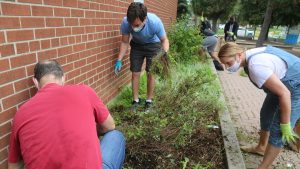
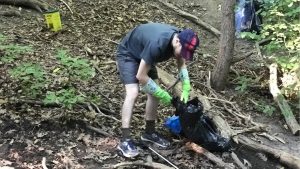
School placements
Extra Ed is still a small business, but we are growing. And as we grow, we are reaching more geographically diffuse schools and communities, while remaining mindful of staying nimble. We put a great deal of effort into assigning instructors to programs that are closer to home to limit commutes.
This is not only good for limiting our overall footprint, but especially good for the programs themselves. After all, instructors are more likely to show up on time when they live close by.
This isn’t always easy to do, and longer commutes than we would like do happen. But we are still always trying on this front, and hope to keep ourselves small and local even as we grow.
Up next
Global partnership!!
More news coming soon.....



